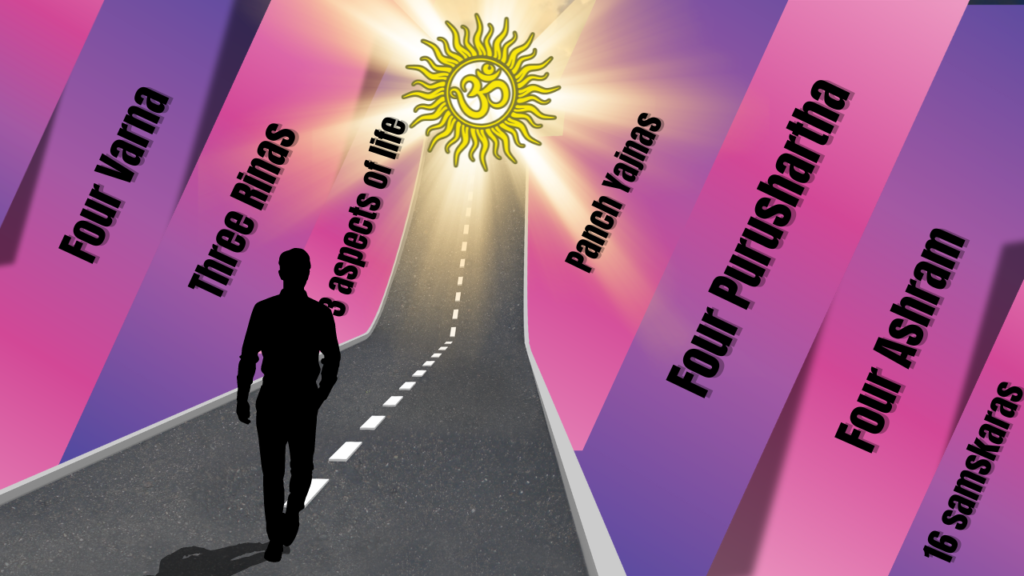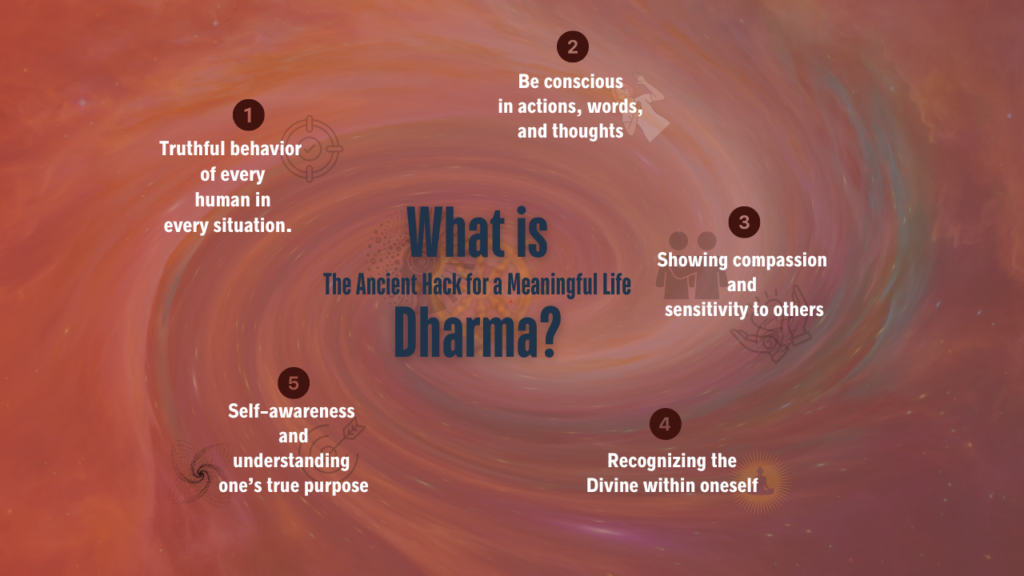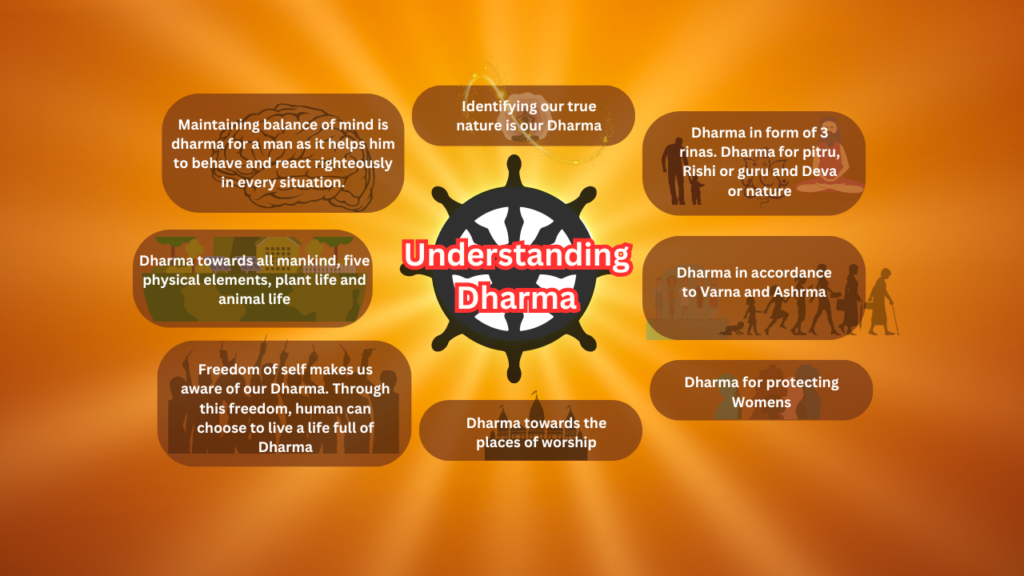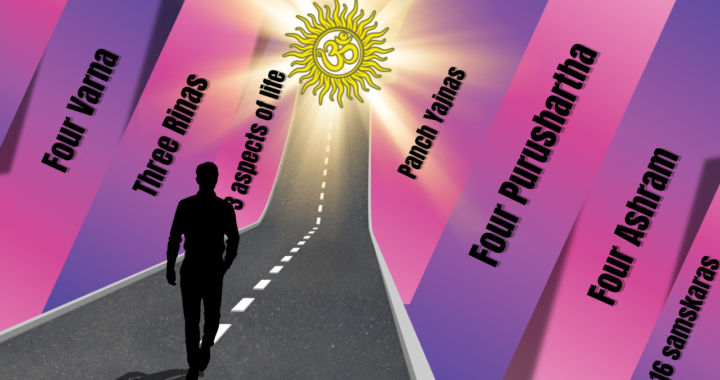
Hindu’s way of life
Hindu gives complete guidelines to the individual and the society, starting with an overall mission in life, with objectives, strategies to fulfill them, and an action plan to follow. Life becomes purposeful and worth living. all the struggles, ups, and downs can be handled with ease and strength.
To achieve this Hindus have established Dharma principles.
To follow this Dharma properly is the mission of every Hindu’s life.
What is Dharma?

Dharma is ordinarily identified with obligation or duty. This meaning indeed is important, but to confine Dharma to this meaning of Duty only is far from correct. Suppose Dharma did mean duty or obligation only. there is nothing which the concept of Dharma can contribute distinctively to the world of thought. Dharma is the cosmic principle of existence. The most important and the fundamental meaning of Dharma is that principle which holds or preserves the whole creation, of which humanity is only a part. The nature of everything which makes it what is, is owing to its dharma. Dharma is the law and order of the entire universe.
Dharma for man consists in the attainment of both the material as well as the spiritual well-being. And this is possible through correctly understanding the nature of dharma of everything that exists in its intimate relation to everything else in the whole world. This is an expression of dharma.
Let’s try to understand Dharma from a different perspective

1. Dharma concerning human ecology
Human ecology means man’s relation with his environment. If we consider an individual man, his immediate environment is made up of his home and its surroundings. His family members and Neighbours, his other relatives and his community, his countrymen, and the entire mankind constitute his proximate and distant surroundings.
Apart from this human social environment, he comes into immediate contact with the five physical elements, as also the plant life and the animal life around. It is obvious that he exists because all these directly or indirectly help him to exist, to live, and to grow. Man needs them and owes them all for his sustenance. His dharma arises from this responsibility to nature.
2. Maintaining mental balance is Dharma
The same is true of mental balance. The ideal state of mind is when it is completely free from imbalances of any kind of excitement or passion. The yoga system which accepts the dualistic metaphysics of Sankhya develops a method of claiming the mental modifications to reach a state of mental equilibrium. Maintaining this level of mind is also dharma for a man as it helps him to behave and react righteously in every situation.
3. The Vedantic ontology of Dharma
Actually, there is no dualism between nature and man, as per Vedanta. There cannot be purely material existence which is independent of spirit. All existence is characterized as sat-ćit-ananda or being-consciousness bliss, or reality knowledge value. To be in this state is to be in dharma, any deviation from this is dharma.
4. Dharma is impersonal and eternal
Eternal truth or order is recognized as Sanatana dharma by which all existence is maintained and preserved. (Esa Dharmah Sanatanah).
5. Freedom of the Self, not of the will
There is one important respect in which the Hindu conception of freedom differs from the Western conception. While the Western idea is that of the ‘freedom of the will’, the Hindu conception is that of ‘freedom of the self, Not icha-svátantrya’ but ‘ätma-svätantrya
Free will is the belief that humans can freely choose their actions and destinies, independent of external forces. whereas Freedom of self involves positive internal autonomy. It’s more than just making choices; it’s about having control over our lives.
What a person is now is what he has made himself through the free activities of his past lives. His general experiences of enjoyment and suffering are owing to his own past free actions. Man is born with certain innate attitudes and in such circumstances or environments which are the result as determined by his previous activities of earlier births. But each conscious action in this life, though largely determined by his already given personal make-up, is to a certain extent also freely initiated by the original intimations coming from his inmost spirit.
A sense of freedom is born of consciousness. Experience of freedom is possible only in the case of human beings, and not in non-human existence. Because of this Consciousness, humans become conscious of their duties and rights, obligations and responsibilities. It is indeed possible for him to lead a life of maximum goodness and realize perfection if he so chooses. In short, he can live a life full of dharma.
6. Three Rinas: Fulfilling Dharma towards the nature and surroundings
The field of duties does not come to be limited to the human world. Men have duties to perform to the non-human world also and in these cases, no claim of rights could ever be possible. Human beings owe duties to animals, to plant life, and to the physical existence in general to preserve them in the worldly order as a whole Men have to be conscious of their duties, without entertaining any claims for rights to be protected from this non-human world.
Duties to the unseen existences The human beings have to observe their duties not only in relation to the external world which is a matter of our experience. They have also to perform duties toward the unseen world. There is a conception of the fulfillment of obligations (rnas) that man owes to the deities (deva rina) by performing sacrifices and worship (Yajnas, pujas), to the ancient sages (rishi rina), by performing a study of the Vedas, to the forefathers (pitra rina), by giving birth to progeny for the continuation of the human race and to humanity in general (samaja-rina), by performing selfless charitable works (dharma-dana).
7. Variety of Dharma
The karmas or dharmas are divided into general (samanya) for instance truthfulness, non-violence, etc; and particular (Višesa) following from the special status and stage in man’s life.
This special stage define by Varna and Ashrama
Four Ashram
In Sanatana Dharma life is divided in four stages. The goals and duties of each stage are different. Following these duties and goals is Dharma.
- Brahmacharya – 1st stage in life that of studenthood
- Grihastha – 2nd stage in life of running a household
- Vanaprastha – 3rd stage (1) Allowing the youth to take over, (2) Engaging oneself in useful social service and (3) Introspection and analysis of ways and means to rid ills afflicting the society.
- Sannyasa – 4th and final stage in life that of renunciation.
Four Varnas
Each human has different liking and skills, to use this linking and skill for the benefit society and their own growth, work is divided in to the four Varnas. Again Duties and goals for each Varnas are different and following them is Dharma.
- Brahmin- Work as Gurus. Gain the knowledge and depart to others.
- Kshatriya- protect and manage the society
- Vaishanavas- does business
- Shudras- skilled artisans and craftsmen
16 Samskaras
Hindus have to follow 16 samskaras during their life. These series of rituals and ceremonies mark the various stages of Human life from birth to death.
The 16 samskaras hold cultural and spiritual significance. These rituals mark various stages and milestones in a person’s life, providing a framework for physical, mental and spiritual growth.
8. Dharma for protecting the places of worship
Mandiras the houses of gods, and the temples are a peculiar feature of the Hindu mode of worship. Particular deities are installed in the sanctum sanctorum of the temples and that place is considered to be the most sacred. It is the bounden duty of a Hindu to protect their purity and sacredness from defilement even at the cost of his life.
Along with these Hindus considered women to the highest figure in society. They treat them with uttermost respect.
Conclusion
As a whole Hindus have designed their daily activities in such a way that it gives meaning to life and provides milestones to reach the ultimate goal. It starts with understanding and following Dharma and goes through different stages, roles, and responsibilities to make life full of meaning and goals set.

